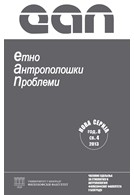"Islam" u anti-multikulturnoj retorici političara i antropologa Zapadne Evrope: kongruencija ili koincidencija?
"Islam" In the Anti-Multicultural Rhetoric of Western European Politicians and Anthropologists: Congruence or Coincidence?
Author(s): Marko Pišev, Miloš MilenkovićSubject(s): Anthropology, Law, Constitution, Jurisprudence, Islam studies, Politics and religion, Politics and society, Migration Studies, Ethnic Minorities Studies
Published by: Филозофски факултет, Универзитет у Београду
Keywords: "the end of multiculturalism"; "the failure of multiculturalism"; anthropology; the concept of culture; culture in politics; anthropology of state and law; Europe; Islam;
Summary/Abstract: The recent rhetoric of the "end" or "failure" of multiculturalism in Europe and beyond came as no surprise to anthropologists. Moreover, the statements made by leading politicians of key European economies seem as though they are based on the decades old anthropological critique of the consequences of the failed implementation of multicultural policies in Europe and on the global level. It is as though the messages we have been getting over the course of the last few years – that multicultural policies are contraindicated, that they weaken the contacts between cultures, rob individuals of the right to change and chose their identities and strengthen intra-cultural mediators of power, with patriarchy, violence against women and children, leaving school, religious fundamentalism and even terrorism as main consequences – are being read by politicians from anthropological analyses of abuses of collective "cultural" rights. The paper considers the nature of this similarity between the discourse of politicians and anthropologists with a special emphasis on the status of "Islam" in them, and discusses whether it is congruence or mere coincidence of stances toward minorities, immigrants and cultural differences, as toward the regulations which were tasked with protecting this diversity as a fundamental European value which today, at least at the rhetorical level, seems to be fading.
Journal: Етноантрополошки проблеми
- Issue Year: 8/2013
- Issue No: 4
- Page Range: 965-985
- Page Count: 21
- Language: Serbian

